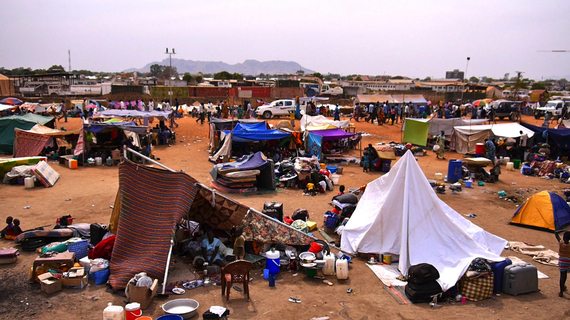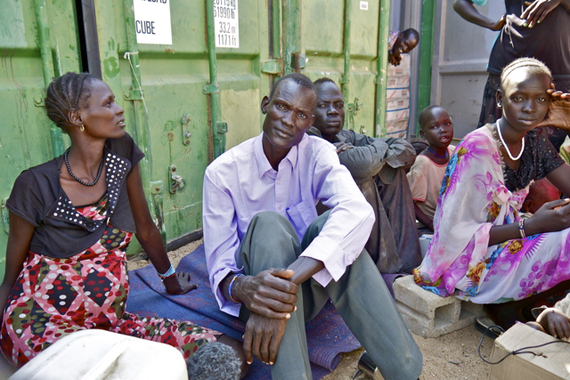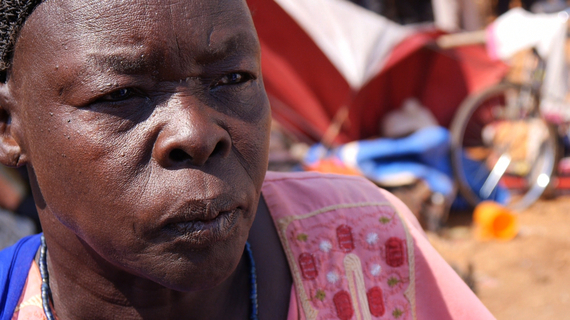Becoming Displaced:
When your community is overrun by violence and your neighbors are being killed in front of you, your natural reaction is to run. To take your family and whatever possessions you can carry and seek refuge in a safe place. Suddenly, in the eyes of the world, you have gone from being a person to being an Internally Displaced Person. An IDP.
On December 15, and in the days that followed, that's exactly what happened to tens of thousands of people in South Sudan. Today, the United Nations estimates there are at least 200,000 IDPs across the country as a result of ongoing fighting between government and opposition forces. Many have sought shelter in UN compounds -- military and logistics bases which have been transformed into displacement camps. Take a walk through one of these camps, and you soon realize that behind the statistics and the acronyms are real people with hopes, dreams and ambitions for themselves and their families.
Joseph:
Tall and graceful, with intelligent eyes and an understated manner, Joseph welcomes me to a corner of Juba 3 camp, where about fifteen people, mostly women and children, sit in the shade of a shipping container. This has become their home -- a few mats on the ground, some blankets draped over sticks and a couple cooking utensils. All around us are hundreds of other families, living in similarly scant conditions.
Joseph and his family had recently decided to return to South Sudan from Kenya to make a new life. "We arrived in Juba at nine o'clock on the night of the fifteenth," he says, shaking his head. "The fighting broke out at ten." In the space of sixty minutes, their dreams were shattered. "We saw some really terrible things," he tells me. "I saw people die."
Joseph used his savings to send his wife and children back out of the country, while he and his relatives joined the ranks of the displaced. "It is very dirty here and we are hungry," he says, "but we are glad to feel protected."
Sarahe:
On the other side of the camp, Sarahe has just arrived. She and her family of six have made the arduous journey from the town of Bor, which is the capital of Jonglei state and the scene of some of the fiercest fighting over the past few weeks. She is clearly exhausted. "It was really bad there," she says, "a lot of gunfire and many people dying. A jet fighter was bombing people from the air."
Sarahe tells how the family, among them three children, fled the town on foot. "We walked for three days with nothing to eat, just to get away." Eventually they were escorted to Juba by soldiers from UNMISS, the United Nations peacekeeping mission for South Sudan. "We are just glad to be here, where we feel safe and can get something to eat."
Martin:
"On the outside I was a community leader," Martin tells me. "We came to Juba a year ago from Jonglei." A small, soft-spoken man, he is missing most of the fingers on his right hand as a result of polio. Inside the roughly constructed shelter behind him are his wife, sister-in-law, a niece and five children of varying ages.
The horror is still fresh on his face as he recounts their experience of becoming displaced. "They were killing people outside our house," he says. "We saw one man, a civilian, die right in front of us. We were so scared we just ran away. Now we live here." I ask Martin about the future, and if he has thought about going home. He stares into the distance for a moment and then turns back to me. "If we try to go home, we will be killed...our future is today."
People:
To the international community, Martin, Joseph, Sarahe and their families are now IDPs. It means nothing to them. In their own eyes they are just who they always were -- father, mother, brother, sister, son, daughter, wife. People.
The names of the people who feature in this story have been changed for security reasons. Concern Worldwide is working with those affected by the conflict in South Sudan, distributing emergency food and household supplies, providing water, sanitation and hygiene facilities, and treating malnutrition in young children. For more, visit concernusa.org



